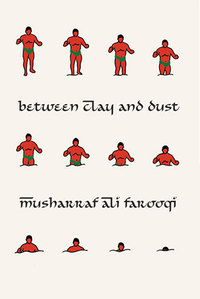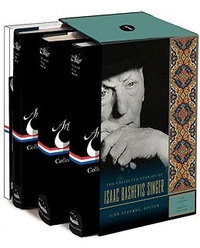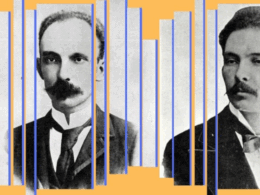
Our series of guest blog posts by writers of fiction, history, essays, and poetry continues today with a contribution from writer, translator, storyteller, and publisher Musharraf Ali Farooqi. His most recent novel, Between Clay and Dust, was a finalist for the Man Asian Prize for Literature and was published in the United States earlier this fall by Restless Books.
Below, Farooqi offers an appreciation of Isaac Bashevis Singer, whose three-volume Collected Stories has just been reissued by The Library of America as a boxed set.
As I opened the Library of America’s booklet Singer: An Album, which accompanies the three-volume boxed set of Isaac Bashevis Singer’s collected short stories edited by Ilan Stavans, I chanced upon a double-spread of Singer sitting in his Manhattan apartment, flooded with old newspapers, boxes, and books. The table is no longer accessible, piled high with detritus and cordoned off by files, notebooks, and manuscripts. Not only did I regard the scene with a feeling of déjà vu, it is by far the best argument I now have for my wife that the journey to the Nobel Prize begins in a cluttered room.
I must confess that even if I hadn’t read a word of Isaac Bashevis Singer, his belief in the literary judgment of children (“children read books, not reviews”), his pride in writing “ghost stories,” and his lack of interest in modern fiction would have endeared him to me for life.
There was also Singer’s heroism in writing in Yiddish, a dying language, the quiet bravado of his publishers, and the dedication of his translators— among them Saul Bellow, who first introduced him to the English language with his translation of “Gimpel the Fool.”
And I think Singer’s Nobel lecture and banquet speech should be compulsory reading for all students of literature.
But I discovered all that later, long after the day I sat in a daze after first reading his stories, raging with jealous admiration, and asking myself over and over again: Could better stories than these be written?

What first struck me about Singer’s stories was how the view never closed upon the heavens. The shuffling of spirits, the clatter of angels and demons, and God’s brooding presence were all eerily palpable. In what Singer wrote, however, he wasn’t concerned with what was above, but what lay below, under the grinding heavens. What drew one’s notice was the cosmos of grief and rapture, purity laced with perversion, and a vulnerable divinity encircled by malevolent evil; how Singer blew life into the furniture of inanimate eschatological legends and myths, transforming them into literary fictions to document deviant human urges, man’s shabby dignity, and his glorious ignominies; and how he made the Earth a mirror of the heavens, and the heavens a reflection of the human theater.
And that only covered a portion of Singer’s short stories. There was the autobiographical material besides, and the tales of survival of the Jewish community, always written with a compassionate understanding of human folly and deep sense of tragedy.
What distinguished Singer for me among the great masters of twentieth century literature was the metaphysical world he created with his stories that focus on the irrational, the perverse, and the diabolical. An ordered world is almost forced upon Singer’s novels by the realist tradition in which the majority of them are written.
As someone born into one of the Abrahamic faiths, I found Singer’s world familiar even though the demons and ghosts were called by Yiddish names. Singer’s regularly-recurring apocalyptic events and messianic phenomena, as well, had themes in common with Islam. Also familiar was the religion’s preoccupation with human sexuality. At first sight, Singer’s stories offer a template for creating fictions about the depredations of faith and human sexuality in the metaphysical theater. But while these works stand as a rare example in modern literature of the conflicts and travails of the life of faith, he wasn’t writing from within the faith, or even as a believer. Singer was writing from a faith, however, and he never discounted spirituality.

His stories mock the great heights of learning to which the human intellect aspires, and man’s grand structures of metaphysical engineering, in the guise of which rationality tries to intrude upon belief. Singer repeatedly shows us that such aspirations are a variety of perversion in man, who is, fundamentally, an irrational creature. It is a vulnerability which draws both the forces of faith and degeneration towards him. We see the man of great learning crumble into turpitude which, incidentally, opens up a path to redemption and a return to sanity.
Singer didn’t just create a template for the explorations of these themes in literature; he also offered an alternate metaphysics, in which human beings could find spiritual truths in the directions of their passions, and the bent of their relationship with each other. As he himself explained, “the pessimism of the creative person is not decadence, but a mighty passion for the redemption of man.” It was a theme central to Singer’s work and its popularity.
Singer’s universal appeal comes from his focus on the tribe, his explorations of the family and community life and their spiritual foundation. He wrote of his fear that the family was on the verge of losing its spirituality. When he spoke of these consecrated bonds Singer spoke to everyone. For it is in the exercise of our collective existence as the human family that we are most alike in our aspirations, our impulses and our delusions, and as the human family that our spirituality is threatened.
It is what makes Singer’s world my own.
The author of three novels and several works for children, Musharraf Ali Farooqi writes the _LiveMint, and his critically acclaimed translation of the Urdu epic The Adventures of Amir Hamza was published by Modern Library in 2007. Farooqi divides his time between Karachi and Toronto and can be reached via his website and Twitter.
Audio: Listen to a 2004 panel discussion, “The Imaginary World of Isaac Bashevis Singer,” featuring Ilan Stavans, editor of LOA’s Singer edition, and Library of America Publisher Max Rudin (1 hr., 9 min.).



